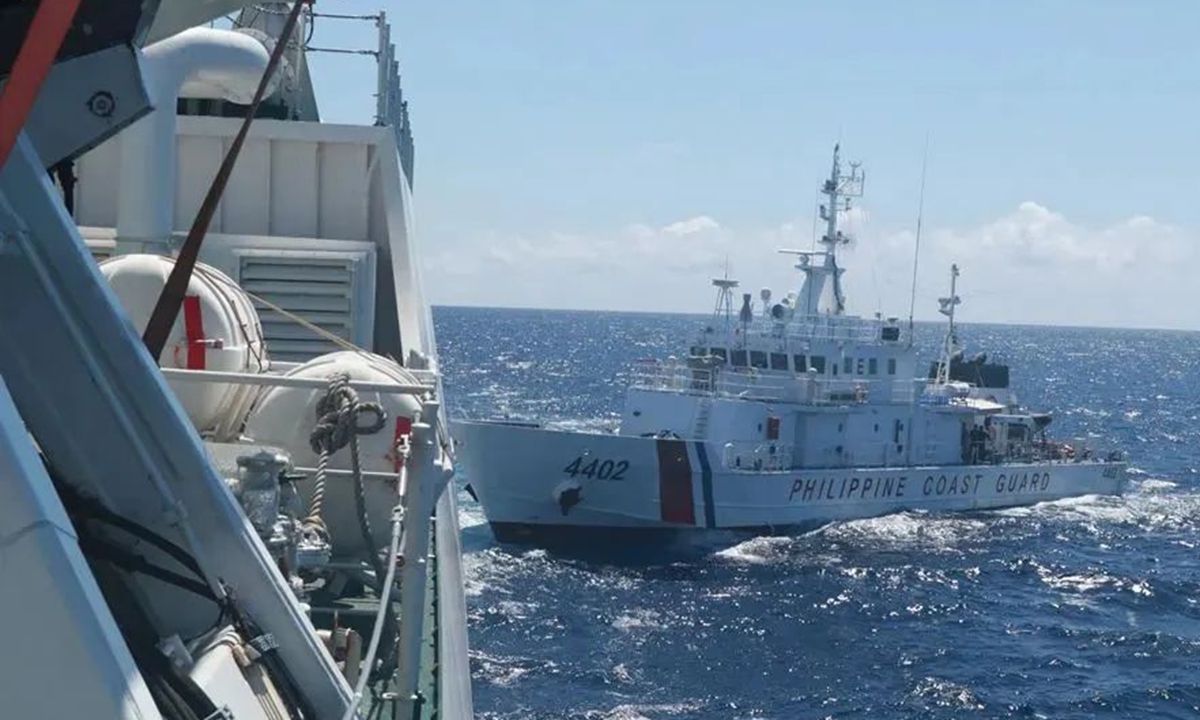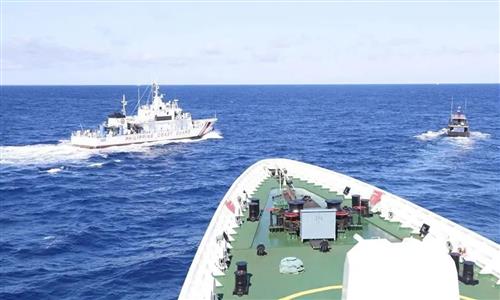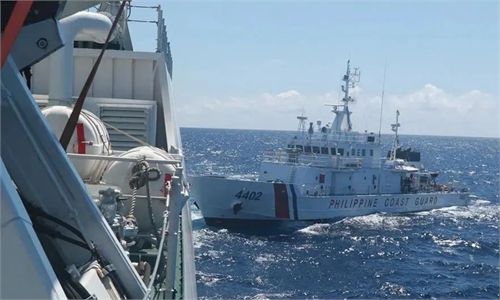China firmly safeguards its national sovereignty against Filipino Ren'ai Reef provocation: China's Ministry of National Defense

China Coast Guard drives away Philippine vessels intruding into waters of China’s Nansha Islands
China Coast Guard (CCG) ships carried out reasonable, lawful, professional on-site operations in accordance with established norms and China will continue to take necessary measures to firmly safeguard its national sovereignty while calling on the Philippines to honor its commitments and immediately cease all provocative actions, China’s Ministry of National Defense said on Tuesday in response to the recent Filipino Ren'ai Reef provocation.
The Philippine Coast Guard and Armed Forces have accused the CCG of blocking and using water cannons against its vessels delivering personnel and supplies to the Ren'ai Reef and also condemned China for violating international law.
Patrick Ryder, the spokesperson of the Defense Department of the US, said the US Defense Department has joined the Philippines in condemning the use of water cannons against Philippine vessels by CCG near Ren’ai Reef in the South China Sea.
Wu Qian, a spokesperson at China's Ministry of National Defense, said on Tuesday that China has sovereignty over the Nansha Islands, including the Ren’ai Reef, based on historical and legal grounds. In recent times, the Philippines has violated its commitments and attempted to transport building materials for overhauling and reinforcement to an illegally grounded warship in the South China Sea. This action has infringed upon China’s sovereignty and violated the Declaration on the Conduct of Parties in the South China Sea.
CCG vessels blocked the Philippine ships in accordance with law and took warning enforcement actions. Given that China's repeated verbal dissuasion and warnings proved ineffective, the CCG used water cannons for warning purposes in order to avoid direct interception and collision, Wu said, noting the CCG carried out reasonable, lawful, professional on-site operations in accordance with established norms.
China will continue to take necessary measures to firmly safeguard its national sovereignty while calling on the Philippines to honor its commitments and immediately cease all provocative actions, Wu said.
Meanwhile, China strongly opposes the US' remarks that disregard facts and the US' groundless accusation against China of its legitimate and lawful maritime law enforcement actions, since the US is not a party directly involved in the South China Sea issue and has no right to interfere or meddle in this matter, Wu said.
We demand that the US should immediately cease using the South China Sea issue to sow discord, and call on the US to earnestly respect China's territorial sovereignty and maritime rights and interests in the South China Sea and to respect the positive efforts made by regional countries to maintain peace and stability in the region, Wu noted.
Meanwhile, the Chinese Embassy in the Philippines also said on Tuesday in response to the recent Filipino Ren’ai Reef provocation that China firmly opposes any word or action that create tension or provoke confrontation in the South China Sea, adding that it’s not a "hunting ground" for countries outside the region to sow discord and provoke division and the US' attempt is doomed to fail.
The Spokesperson of the Chinese Embassy in the Philippines stressed that Ren’ai Reef has always been part of China's Nansha Islands. The historical context of the issue of Ren'ai Reef is very clear, and China’s position on it is consistent and firm.
According to the spokesperson, China has always stayed committed to maintaining peace and stability in the South China Sea. Important common understandings exist between China and the Philippines on managing maritime disputes, effectively preserving peace and stability at relevant waters. Adopting a humanitarian approach, China has made temporary special arrangements for the Philippines to deliver necessary life supplies such as food to the “grounded” military vessel.
But for some time, the Philippine side has been taking unilateral actions once and again, and seeking to overhaul and reinforce the military vessel in order to permanently occupy Ren'ai Reef. The Philippines' action violates international law and the Declaration on the Conduct of Parties in the South China Sea (DOC), the spokesperson said.
To avoid incidents at sea, China has repeatedly communicated with the Philippines beforehand through diplomatic channels on Ren'ai Reef. China made it clear to the Philippines that it shouldn't send construction materials meant for overhauling and reinforcing the "grounded" military vessel on a large scale, and suggested that the two sides hold talks as soon as possible on ways to manage the situation at Ren’ai Reef, which is a clear display of China’s goodwill and sincerity, the spokesperson said.
Regrettably, in disregard of China's repeated warnings, the Philippines tried to deliver the construction materials for overhauling and reinforcing the "grounded" military vessel. This is the cause of what has happened there this time. Under such circumstances, the Chinese side was forced to respond with necessary moves. China Coast Guard took warning law enforcement measures in accordance with the law, the spokesperson added.
The spokesperson also stressed that, the South China Sea is not a "hunting ground" for countries outside the region to meddle with, sow discord and provoke conflicts.
For a time, the US has been inciting and supporting the Philippines' attempts to overhaul and reinforce its military vessel that was deliberately "grounded" on Ren'ai Reef. The US even sent over military aircraft and vessels to assist and support the Philippines, and repeatedly sought to threaten China by citing the US-Philippines Mutual Defense Treaty. The US has also rallied certain allies to persistently sensationalize the South China Sea issue, extensively hype up the recent maritime incident and attack China's legitimate and lawful actions at sea, the spokesperson noted.
Justice lies not in the loudness of one's voice, but in the truth and rightness. The US attempts will lead nowhere. China unequivocally rejects words and actions that aim to stoke tension and confrontation in the South China Sea. We urge the US to respect China's territorial sovereignty, maritime rights and interests in the South China Sea, and respect regional countries' efforts to uphold peace and stability in this region, the spokesperson added.
Global Times


